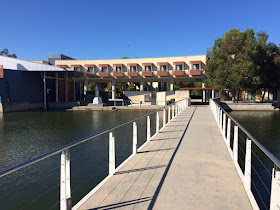An antipode is the spot on the other side of the world from where you stand. If you stood in Washington, DC and tunneled through the Earth you’d emerge near Perth, Western Australia (well, more or less).
And since the White House last year released their vision for police reforms, Report on the President's Task Force on 21st Century Policing, that tunnel will have many advantages aside from 4,000 fewer surface travel miles.
Following months of anti-police violence and racial discord on American streets, the Task Force report responded with a far-reaching call for police reform. Given similar, albeit less dramatic, calls for reform elsewhere across the globe, this report is an oracle for a better future in many countries.
FROM WARRIORS TO GUARDIANS
The Task Force wants to transform police culture from warriors to community guardians. Problem-based learning (PBL) and the field training equivalent called PTO were two ways it recommended getting there. This delighted those of us who developed and wrote those programs for the COPS office and the Reno Police a decade ago.
That is where the Washington-to-Perth tunnel comes handy.
My colleague Gerry Cleveland and myself spent last month working with curricula developers and instructors at the Western Australia Police Academy north of Perth. Coincidentally these were major steps that accomplished many of exact recommendations in the Task Force report.
 |
| Modern architecture at the WA Academy |
A BETTER 21ST CENTURY
Walking onto the WA Academy you admire the beautiful ultramodern architecture. It reminded me of a futuristic Star Fleet Academy from the sci-fi Star Trek series. The physical impression is that forward-thinking training makes sense here.
We certified a number of staff in PBL and emotional intelligence (EQ) skills, the very lifeblood flowing through the Task Force report.
Of course the WA Academy is building upon work already underway elsewhere. For example the academy in South Dakota has a significant head start. They too have trained their staff in PBL/EQ and made major steps into that same future.
If you read our recent book, You In Blue, about this education reform movement, the progress in South Dakota figures prominently.
Similarly at the LAPD academy, PBL trained instructors have made changes to curricula. In the late 1990s the Royal Canadian Mounted Police academy was among the first to experiment with PBL.
 |
| Walkways and running tracks for recruits |
But Western Australia might have three advantages.
- For a number of years they have retained some impressive academy leaders who commit to a future in PBL/EQ – and, unlike some academy directors elsewhere, they don’t waver!
- Their police leadership has committed to problem-oriented policing and evidence-based policing as central to their service delivery.
- One of the stumbling blocks to POP and EBP is a warrior cop culture resistant to change and too few properly trained officers skilled at critical thinking and problem-solving. Critical thinking and problem solving are the primary skills that PBL and EQ teach.
In the U.S., number 2 has to fall first. Hopefully that can be a product of 1.
ReplyDeleteI should have added to number 2 that PBL/EQ training WAS a precursor to POP and EBP!
ReplyDeleteThanks Tim.